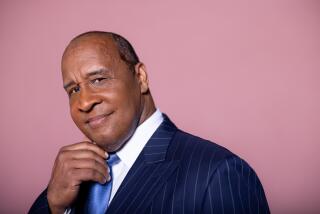Writer Documents Successes of Fellow Blacks : Entrepreneur: Acclaimed books are largely devoted to friends, neighbors, acquaintances and life in Chicago.
- Share via
CHICAGO — For a man who runs a multimillion-dollar real-estate investment firm, Dempsey Travis has found plenty of time to write books about himself and black Chicago.
During the last 10 years, Travis has written four autobiographies, a children’s book, a business tome and a biography of Harold Washington, the city’s first black mayor and a childhood friend.
Three of the autobiographies, while dealing with his experiences, are largely devoted to friends, neighbors, acquaintances and life in Chicago.
But the fourth, “I Refuse To Learn To Fail,” released this year, focuses on Travis, moving from his impoverished childhood on the South Side, to his attempts to become a jazz musician, to his position as one of the city’s premier black businessmen.
“When you reach 72, you realize that if there’s a story to be told, you’d better do it while you’ve still got your marbles,” he said in an interview.
All of the books were published by Urban Research Press, founded by Travis 15 years ago to publish studies on socioeconomic issues affecting urban blacks.
Janice McNeill of the Chicago Historical Society said Travis’ books on black Chicago fill a gap in the city’s history.
“He tends to focus on African-American contributions to the history of Chicago,” she said. “For a long time that wasn’t covered in histories or was covered in a very small way.”
Travis said publishers rejected his first book, “Autobiography of Black Chicago,” 24 times because they didn’t think the subject would interest the general public.
Urban Research Press had the book on the bookshelves the day after Thanksgiving, 1981. By Christmas of that year, the book was a bestseller at Chicago’s largest bookseller.
“I followed that with the “Autobiography of Black Jazz” a year or so later,” he said. “I thought that perhaps the first one was a fluke.”
That book also became a local bestseller and still sells well.
In the book, Travis discusses the influence mobster Al Capone had in promoting jazz and black musicians. Capone’s speak-easies employed many great jazz artists, including trumpeter Louis Armstrong and cornetist Bix Beiderbecke.
The book is used by Ernest Brown, a music professor, in his history of jazz course at Williams College in Williamstown, Mass. Brown said the book offers insight into the practical side of life for jazz musicians in the 1930s.
“It is important to understand jazz music as something produced by real people with low-paying jobs,” he said. “Despite all that, they produced these gems. It helps people to appreciate music better.”
Judith Krug, a vice president of Kroch & Brentano’s, Chicago’s largest bookseller, calls Travis a “Renaissance man” for the variety of subjects he has written on. She said the general public has received his books well even though he has concentrated primarily on blacks’ experiences.
She said, “He is an educated man, and he knows his subjects.”
Travis’ latest book, “I Refuse To Learn To Fail,” traces his family’s migration to Chicago from the South.
He spoke of his early goal to become a musician like his high school classmates--singer Nat (King) Cole, pianist Dorothy Donegan and singer Johnny Hartman. But while directing a band in the Army, he realized that he never would attain their excellence.
He later attended Roosevelt University and then law school. But after seeing that lawyers were not doing as well financially as he expected, he obtained a real estate license and built a real estate, mortgage banking and insurance business. He said the work was rewarding, spiritually and financially.
Travis also discusses successful black men such as author Willard Motley, actor Richard B. Harrison, who starred in “The Green Pastures” on Broadway, and Jesse Bingar who organized Illinois’ first black-owned state bank.
“Bingar owned blocks on the South Side. I saw that,” said Travis, whose Travis Realty Co. is among the nation’s largest black-owned real estate-development firms.
“I own blocks. I own blocks because I know a black man can own blocks. Suppose I never saw a black man owning blocks. I’d probably think all I could own was a condo, a townhouse, a bungalow.
“Black businessmen owe it to ourselves and our people to put our experiences on paper,” Travis said. “America is about running business. Unless little Joe, or little Frankie or little Lucille can look and see that there was someone before them who did something, you don’t have much of a guidepost. And I think that is important.”
More to Read
Sign up for our Book Club newsletter
Get the latest news, events and more from the Los Angeles Times Book Club, and help us get L.A. reading and talking.
You may occasionally receive promotional content from the Los Angeles Times.










